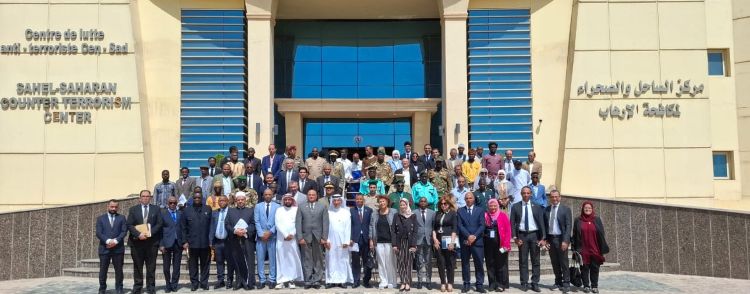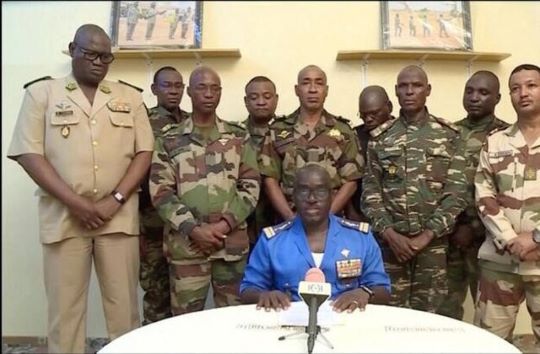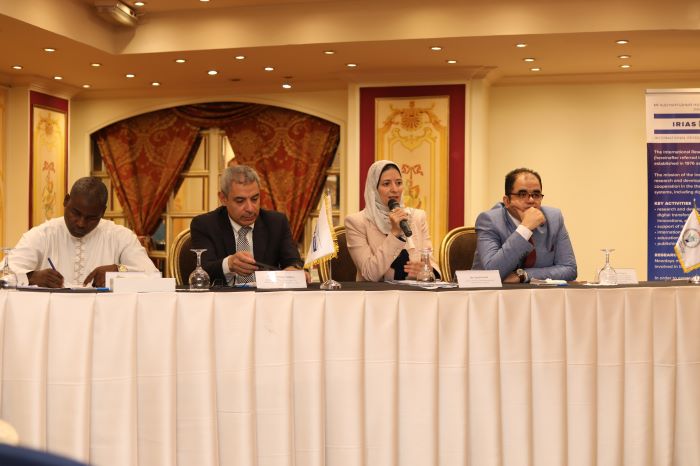
19-20 May 2025
The African Center for Research and Strategic Studies (ACRESS), in cooperation with the Sahel and Sahara Center for Counterterrorism (CTC) in Cairo and the International Research Institute for Advanced Systems (IRIAS) in Moscow, organized the First International Conference titled:
"Terrorism in West Africa and the Sahel: Challenges of Development and Integration"
The conference took place on Monday and Tuesday, May 19–20, 2025, at the headquarters of the Sahel and Sahara Center for Counterterrorism in Cairo. It featured the participation and presence of speakers from various African, Arab, and European countries.
The Guest of Honor was the Islamic Military Counter Terrorism Coalition (IMCTC) from the Kingdom of Saudi Arabia, which was established in 2015 by His Royal Highness Prince Mohammed bin Salman, Crown Prince and Prime Minister.
Among the distinguished attendees were:
- H.E. Counselor Ahmed Moharram, Director of Sahel Affairs, representing the Egyptian Ministry of Foreign Affairs and Immigration
- Ms. Maya Ragab, Program Coordinator at the Cairo International Center for Conflict Resolution, Peacekeeping and Peacebuilding (CCCPA)
- A number of African, Arab, and foreign ambassadors and diplomats in the Arab Republic of Egypt, including:
- H.E. Amb. Guy Rodrigue Gambi, Ambassador of the Central African Republic to Egypt.
- H.E. Amb. Charles Angina, Deputy Head of Mission, Embassy of Uganda in Cairo
- Mr. Abdulrahim Al-Amri, Counselor of the Embassy of the Kingdom of Saudi Arabia in Egypt.
- Mr. Mohamed El-Amin, Economic Counselor of the Embassy of Mauritania in Egypt.
- Mr. Moulima Mondo Bouyo, First Counselor at the Embassy of the Democratic Republic of the Congo in Egypt.
- Mr. Fernando Nhaca, Second Counselor at the Embassy of Mozambique in Egypt.
- Brigadier General Zhou Shan Ban, Deputy Military Attaché at the Embassy of China in Egypt.
- Mr. Roman Barknyshev, Assistant Military Attaché at the Embassy of the Russian Federation in Egypt.
- Mr. Ali Traore, Military Attaché at the Embassy of Burkina Faso in Egypt.
Also in attendance were other military attachés of embassies in Egypt, as well as a number of foreign officers currently studying at Egyptian military colleges, including students from Mali, Tunisia, Algeria, Niger, South Sudan, and other African countries.
In addition, the conference witnessed the participation of Mr. Hussein Warsami, President of the General Union of African Students in Egypt, along with executive office members and representatives of African student unions in Egypt from Somalia, Nigeria, Liberia, Gambia, Mauritania, Senegal, Mali, Guinea-Bissau, Guinea-Conakry, Burkina Faso, Malawi, Chad, Sierra Leone, Côte d'Ivoire, Benin, and Cameroon.
The conference commenced with the opening session, which included speeches from the organizers. Major General / Dr. Mohamed Abdel Basset, Director of the Sahel and Sahara Center for Counterterrorism, affirmed the Center's commitment to supporting and assisting the Sahel countries. He emphasized the importance of addressing the issue of terrorism through advanced and adaptive approaches in line with the international transformations affecting our present reality. He further highlighted the Center's interest in cooperation and coordination with various international entities to activate positive engagement that serves the interests of the peoples of the member states in the Sahel and Sahara region.
In her speech, Dr. Ghada Fouad, Director of the African Center for Research and Strategic Studies (ACRESS), began by expressing sincere gratitude and appreciation to the Egyptian Ministry of Defense, His Excellency General Abdel Mageed Saqr, Commander-in-Chief of the Armed Forces and Minister of Defense and Military Production, and all institutions of the Egyptian Armed Forces for their efforts in organizing this conference and for the open-minded vision of the Egyptian leadership in cooperating with Egyptian research and intellectual institutions.
She noted that this conference represents a positive model of fruitful and constructive cooperation between civil society and the national military institutions of Egypt, yielding benefits for our beloved Egypt and for the sisterly African nations.
Dr. Fouad also underlined the strategic vision of ACRESS in addressing the pressing issues facing Africa — particularly terrorism — from new perspectives and innovative viewpoints. She pointed out that the societies of West African nations are currently suffering not only from the spread of extremism and terrorist operations but also from increased levels of poverty, which has led to displacement and migration among populations, with negative consequences for countries within the region and neighboring states.
This is despite the abundance of rich natural resources available across the region. These challenges have adversely impacted both civilian and military life in West and North Africa.
Furthermore, due to the evolving nature of the operations carried out by extremist and separatist groups — particularly in terms of the sophistication and range of weapons used — governments in the region are facing major obstacles in attracting investment. This has hindered their ability to exploit their resources effectively, especially in areas where militants and extremists are prevalent.
Therefore, in order to present a comprehensive perspective on the underlying causes of the growing extremism in West Africa, and to examine the strengths and weaknesses of the current mechanisms employed by ruling regimes and other stakeholders in the region—particularly in the Sahel and Sahara areas—the Center’s administration identified a number of key themes for discussion during this conference. These themes aim to shed light on critical root causes that are often overlooked, yet serve as major drivers behind the spread and expansion of terrorism and extremist movements in the West African region. These include ethnic conflicts and economic interests that have developed between extremist groups and networks of organized crime, in addition to various separatist and rebel groups.
The Center's vision also made a point to address the role of economic sanctions imposed—some of which remain in place—on certain regimes in the region, emphasizing that these sanctions have become significant obstacles that limit the ability of states to combat terrorism and its associated activities, particularly in the African Sahel.
Dr. Fouad further emphasized that all religions advocate for peaceful coexistence, tolerance, and acceptance of others, and that the reality of terrorism is in fact driven by networks of economic and financial interests and longstanding ethnic disputes, both old and new. These factors are among the primary motivations for the continuation of terrorism, and it is therefore essential that such issues be addressed with objectivity and neutrality. This approach was clearly demonstrated and discussed through the research papers presented during the conference sessions, all of which aimed to propose practical and realistic solutions to these challenges.
She also stressed that the conference did not overlook the role of African women in countering extremism, noting that women are often the first victims of such violent operations, facing rape, murder, and abduction. As such, it is imperative to highlight their participation and listen to their voices in the fight against extremism.
In conclusion, Dr. Fouad stated that, in recognition of the importance of showcasing successful and positive examples in dealing with terrorism, the organizers were keen to present three case studies of effective counterterrorism efforts:
1. The Islamic Military Counter Terrorism Coalition (IMCTC);
2. The pioneering Egyptian experience in eradicating terrorism;
3. And the experience of Mauritania in neutralizing extremist groups, despite its geographic location within a region marked by the ongoing presence and activity of extremist factions.
These examples were shared to promote the exchange of expertise and best practices.
Professor Alexander Ageev, Director General of the International Research Institute for Advanced Systems (IRIAS) in Moscow, affirmed that terrorism is a global phenomenon that has afflicted innocent people across many parts of the world. However, in recent years, the number of civilian and military victims in Africa has become alarmingly high, posing a serious threat that warrants in-depth study in order to develop practical and effective solutions with tangible positive impacts on African societies, particularly on women and children.
He also referred to Russia’s efforts to support a number of African countries in their fight against terrorist groups, and stressed the importance of standing united against this threat, which severely limits the ability of these nations to utilize their resources and wealth effectively.
In his remarks, Dr. Hassan Ibrahim Yahya, Secretary-General of the Supreme Committee for Da’wah at Al-Azhar’s Islamic Research Academy, stated that Al-Azhar Al-Sharif is working through its educational, intellectual, and religious institutions to consolidate a framework for intellectual security, in line with the principles established by Islam. He emphasized that terrorism stems from intellectual deviation, both in ideology and in application.
Dr. Amani Al-Tawil, Advisor at the Al-Ahram Center for Strategic Studies and an expert in African affairs, praised the cooperation between the Sahel and Sahara Center for Counterterrorism and the African Center for Research and Strategic Studies (ACRESS), particularly recognizing ACRESS's efforts in capacity building among African youth.
Commenting on the conference and its themes, Dr. Al-Tawil noted that Africa is at risk of an expanding terrorist footprint, accompanied by an increasing fragility of national states, as reflected in international indicators. She pointed out that, according to recent international reports, six African countries currently face terrorism as a primary challenge.
However, she emphasized that direct military intervention by foreign powers to address terrorism has been, in her view, a failed experiment, as evidenced by accumulated data and experiences over the past two decades. Rather than curbing terrorism, such interventions have, in many cases, exacerbated the problem.
She stressed the need for coordinated efforts and networking among stakeholders, and in this context, she commended Egypt’s proactive initiatives in countering terrorism in East Africa on a military level. She expressed hope that the growing cooperation between Egypt and the West African countries, particularly those in the Sahel, will continue and lead to deeper joint efforts in the fight against terrorism.
Over the course of two days, the conference addressed the issue of extremism through four core thematic sessions.
The first theme focused on the drivers and motivations of extremism and terrorism in West Africa. This session featured several scholarly contributions, including:
- “Ethnic Conflicts and its Role in the Expansion of Terrorism” by Dr. Mohamed Abdel Karim, a researcher specializing in African affairs from Egypt.
- “Religious Structures in the Sahel and their Impact on the Spread of Extremism” by Dr. Sam Bousso Abdel Rahman, Professor of Islamic Studies at Cheikh Ahmadou Khadim University in Touba, Senegal.
- “Economic Sanctions and their impact on Terrorism in West Africa” by Dr. Mahmoud Anbar, World Bank consultant and Professor of Economics at Aswan University, Egypt.
The second theme examined the impact of terrorism on unity and regional integration in West Africa. The session was chaired by Professor Ahmed Said El-Bakl, Head of the Economics Department and Vice Dean of the Faculty of Politics and Economics at Suez University, and Director of the Center for Political and Economic Studies in Egypt. Key papers presented included:
- “The Impact of Terrorism on Political Unity and Territorial Integrity in the Sahel Region” by Professor Mohamed Ashour Mahdy, Professor of Political Science at the Faculty of African Graduate Studies, Cairo University.
- “Extremism and Its Effect on the Social Fabric and Human Solidarity in West Africa” by Dr. Mohamed Aal Islem Al-Taleb Oubeid, Associate Professor at Mohamed Bin Zayed University for Humanities, United Arab Emirates.
- “Terrorism and its Effects on Development and Integration in West Africa: A Comparative Model” by Omar Ahmed Al-Bustanji, Jordanian writer, economic analyst, and PhD researcher in Economics at the Faculty of Economics and Political Science, Cairo University.
- “Terrorism and its Impact on African Human Capital” by Dr. Abdel Aziz Abdel Gawad, an expert in labor union strategy from Egypt.
The third theme explored mechanisms for countering extremism in West Africa: analysis and evaluation. The session was chaired by Professor Ahmed Wahban, Dean of the Faculty of Economic Studies and Political Science at Alexandria University.
Contributions included:
- A presentation by Professor Mongia Souaihi, Senior Professor at Zitouna University and expert in human development and Islamic studies (Tunisia), titled “The Role of Women in Confronting Extremism in West Africa.”
- A paper by Dr. Ahmed Yaacoub Dabio, conflict resolution expert and President of the Center for Development Studies and Extremism Prevention in N’Djamena, Chad, on “Assessing Strategies to Counter Extremism in West Africa and the Sahel.”
- A presentation by Professor Hassan Ali, Dean of the Faculty of Media at Al-Madina University in Egypt, on “Evaluating Counterterrorism Strategies in Regional and International Political Communication.”
The final session of the conference was dedicated to reviewing successful strategies for countering terrorism in Africa through case studies of international and national experiences.
Major General Dr. Abdullah Saeed Al-Dowa, Deputy Director of Ideology Department, and Mr. Ashour Ibrahim Al-Juhanni, Director of Research and Studies Department at the Islamic Military Counter Terrorism Coalition (IMCTC) in the Kingdom of Saudi Arabia, presented the coalition’s efforts and initiatives since its establishment by His Royal Highness Prince Mohammed bin Salman. They highlighted the coalition’s capacity-building programs for African armed forces, emphasizing both intellectual and operational support, and introduced a dedicated initiative specifically designed for the Sahel region.
Additionally, His Excellency Ambassador Sidi Mohamed Sidiati, Minister Plenipotentiary at the Mauritanian Ministry of Foreign Affairs and Director of the Office for Studies and Research (BEREX), presented the national strategy of Mauritania for combatting terrorism and extremism.
Finally, the Egyptian experience in combating terrorism was analyzed and presented by Major General Dr. Samir Abdel Ghani from the Military Academy for Postgraduate Studies, alongside Professor Dr. Abdel Salam Nweir, former Dean and current Head of the Department of Political Science at the Faculty of Commerce, Assiut University.
The conference concluded with a set of key recommendations based on the discussions held during the sessions. The most important of these included:
- Emphasizing the importance of programs for Disarmament, Demobilization, Deradicalization, and Reintegration (DDDR) to rehabilitate and reintegrate former members of terrorist groups into society.
- Re-designing regional and international sanctions to be more targeted and effective, focusing on political and military elites responsible for coups, while avoiding direct harm to civilians and essential economic infrastructure.
- Integrating economic interventions with humanitarian and developmental mechanisms, including the establishment of humanitarian exemptions within sanctions regimes and providing direct support to affected local communities, particularly persons with disabilities and special needs.
- Strengthening early warning and rapid response mechanisms within regional and continental organizations, such as ECOWAS and the African Union, to monitor the impact of sanctions on the security and stability of West African states.
- Enhancing the role of moderate traditional religious institutions within communities and developing their capacity to engage youth and address contemporary challenges. This includes building sound educational curricula that promote values of moderation, under the supervision of official institutions at all levels.
- Organizing and unifying the work of religious institutions under a single national authority affiliated with the government. This authority should operate according to a strategic plan aligned with the national interest, ensuring that religious discourse is consistent with state policy.
- Encouraging community participation in the formulation of religious discourse, by involving scholars from the humanities and social sciences alongside religious leaders in drafting sermons that inspire African citizens toward productivity, tolerance, and respect for diversity. This discourse should highlight historical and contemporary examples of peaceful coexistence among different ethnic and religious groups, even if small in scale, and promote such positive images through traditional and digital media to instill these values across generations.
- Empowering women in West Africa to claim their rights to participate in public life, access education, and work. This will enable women to contribute meaningfully to societal reform and the fight against terrorism, while challenging harmful traditions and misinterpretations of religion that undermine their role. Women's participation in international forums and workshops on terrorism and extremism should be prioritized to ensure a comprehensive and inclusive response.
- Organizing training workshops for youth of all genders—including religious figures—to acquire vocational and technical skills for lawful income generation. Each workshop should include participants from diverse ethnic and cultural backgrounds to foster interpersonal connections, promote peaceful coexistence, and strengthen social cohesion within communities.
- Fostering national identity, patriotism, and political unity in the face of growing terrorist threats in the Sahel region. This includes reinforcing civic education, enhancing border security and regional cooperation, and employing intelligent military and security strategies to preempt and neutralize extremist threats. Improving accountability and transparency in state institutions is also critical.
- One of the most significant recommendations emphasized the need for greater collaboration and networking between intellectual and research institutions, national and international stakeholders, and global initiatives focused on combatting terrorism and extremism in Africa and beyond. This collaborative approach is essential for pooling efforts and developing practical, implementable solutions that serve the interests of African nations and their international partners.
- Finally, the conference highlighted the necessity of increasing investment in field-based research to better understand the dynamics and structures of extremist groups. Such studies are crucial for developing evidence-based strategies to prevent and counter terrorism effectively.
At the conclusion of the conference, representatives of the Islamic Military Counter Terrorism Coalition (IMCTC) from the Kingdom of Saudi Arabia honored Dr. Ghada Fouad, Director of the African Center for Research and Strategic Studies (ACRESS), along with her team, in recognition of their outstanding efforts in organizing the conference.
Additionally, Major General Dr. Mohamed Abdel Basset, Director of the Sahel and Sahara Center for Counter-Terrorism, presented an award to ACRESS and its team, commending their excellent organization and the fruitful collaboration between the two centers.
The Egyptian Ministry of Culture also contributed to the closing ceremony with a special artistic performance. The Nile Folk Arts Troupe and the Tanoura Heritage Ensemble performed for the conference guests, offering a message of peace and goodwill from Egypt—the land of peace and security—to all participating delegations. The cultural showcase served as a warm welcome to Egypt and a reminder that art is a universal language of communication among the peoples of the world.
 ar
ar
 fr
fr


